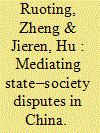|
|
|
Sort Order |
|
|
|
Items / Page
|
|
|
|
|
|
|
| Srl | Item |
| 1 |
ID:
183828


|
|
|
|
|
| Summary/Abstract |
Collaborative governance has gained increasing attention among practitioners and public administration scholars worldwide in the past several decades. However, little is known about government officials’ motivation for or willingness to take collaborative action, which work as a mediating variable between a range of other factors and collaboration as an outcome. Grounded in social action theory, this study examines the factors that enhance local officials’ willingness to participate in cross-departmental collaboration. Survey data and in-depth interviews from Shanghai indicate that a collaborative environment and organisational trust can increase officials’ willingness to collaborate with other departments, while the relationship between technological support and bureaucrats’ willingness is not significant. These findings suggest that defining the administrative power and responsibility of individual government departments, improving administrative accountability and building a sound incentive mechanism are crucial to facilitate local government’s cross-departmental collaboration in China.
|
|
|
|
|
|
|
|
|
|
|
|
|
|
|
|
| 2 |
ID:
175162


|
|
|
|
|
| Summary/Abstract |
Where popular contention in China is concerned, third parties are not merely supporters of protesters but also allies of the state. Through quantitative and qualitative methods, this article uses an actor-centred perspective to explore the dual role of Chinese lawyers in state dispute resolution projects. When providing legal counselling services to the public, lawyers adopt selective strategies and channel non-political cases into legal channels while keeping political cases within the political arena. When handling social disputes for the government, however, they apply professional diagnoses and legal persuasion, and intervene through mediation and negotiation. Three factors constrain the effectiveness of Chinese lawyers during dispute resolution. These are the limited access to cases, the dilemmas inherent in acting simultaneously both as a third party and as a state agent, and the restricted influence of lawyers over the final resolution of social disputes. This article argues that the selective responses of Chinese lawyers during legal counselling and strategic defence of state power in dispute resolution make them a governance tool for stability maintenance. Their participation contributes more to legal repression than to legal development in contemporary China.
|
|
|
|
|
|
|
|
|
|
|
|
|
|
|
|
| 3 |
ID:
172281


|
|
|
|
|
| Summary/Abstract |
Since the 1990s, the Chinese government has built 19 National New Areas (NNAs) in its implementation of the national development strategy. Although public narratives have acclaimed the construction of NNAs as entrepreneurial cities, scant attention has been paid to understanding the internal administration of NNAs as an entrepreneurial agent and the state logic of the NNA governance. Based on the case study of Gui'an NNA, this article attempts to study the multiscalar institutional complicity in China's NNAs. It argues that the Chinese state has the capacity to create new growth poles both by motivating local governments to introduce streamlined administration and by controlling the regions. However, the authoritarian bureaucratic system, despite being the cause of the birth of NNA entrepreneurship, has also obstructed the development of entrepreneurship.
|
|
|
|
|
|
|
|
|
|
|
|
|
|
|
|
|
|
|
|
|